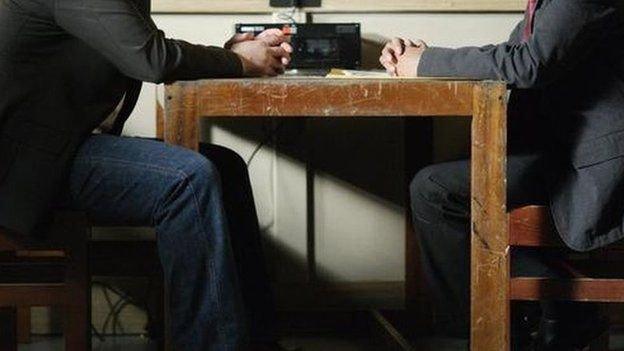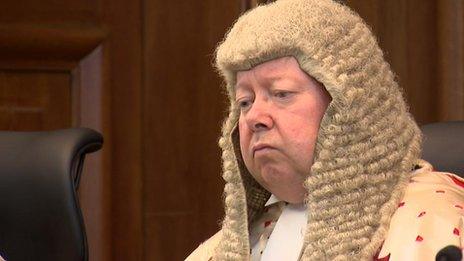Campaign aims to destroy rape myths and misconceptions
- Published
'I Just Froze' aims to give potential jurors a better understanding of the way victims may act
A new campaign aimed at destroying the "myths" and misconceptions around rape is to be launched.
The "I Just Froze" campaign aims to educate the public - and crucially future jurors - that when subjected to a violent or sexual assault many people "freeze" rather than fighting back.
From next month, judges in Scotland will direct the jury to consider that many victims "freeze".
They may also take years to report rape to the police.
Under the Abusive Behaviour and Sexual Harm Bill, judges will now be required to tell jurors there can be "good reason" why a person may delay reporting a sexual crime or did not offer physical resistance, if it is relevant to evidence heard in court.
Last year, judges and lawyers spoke out against the introduction of the statutory jury directions, claiming that preconceptions about sexual offences should be addressed through evidence and discretionary directions.
But experts say the jury are simply being presented with the facts and that such direction will only come at the end of a trial.

'Fear takes over'
Sarah says: "It's important for other victims to know. Your body goes into shock to protect you"
Sarah (her name has been changed to protect her identity) was raped two a half years ago. She says she was shocked both by what happened and how she reacted.
"I'd been brought up to fight back if anything like that ever happened," she says.
"But I didn't fight. I froze. Fear takes over. You don't know what to do. Sometimes it's the safest option. And there's no shame in it. It's important for other victims to know. Your body goes into shock to protect you.
"A lot of people have a stereotypical opinion about victims of rape. But it's not like that."
Sarah was raped at her friend's birthday party.
"I thought rape was someone you didn't know, attacking you in a dark alleyway when you were wearing a short skirt and that wasn't me," she says.
"I was at a birthday party. I wasn't even drunk. I had had two drinks. I wasn't the stereotype. I thought you had to be a certain way to get raped but you can be anybody. They don't discriminate."
And then it happened again.
'Bottled it up'
"He was kicking me, strangling me," she says. "And that night I feared for my life. I knew if I fought back he would really hurt me - if not kill me."
After the birthday party, Sarah went to someone in a position of authority and told her what happened but Sarah says she didn't believe her.
As a result it took her two years to go the police to report that she had been raped.
"After she didn't believe me I thought no-one would," she says.
"I just bottled it up. I only got the confidence to go to the police because I found out through social media that another woman had come forward and made claims about the same man.
It gave me the courage I needed. I know people struggle with reporting it but for me it was freeing. It really helped."
Sarah says she believes the campaign will help victims, jurors and members of the public understand that people react differently to rape.

Sandy Brindley, national co-ordinator for Rape Crisis Scotland, said: "We need people to know that freezing is a normal reaction. Many of us think that we know how we, or other people, would respond to rape, but the truth is there is just no knowing.
"Responses to rape can be so very different to how we would expect or imagine that some people find them hard to believe.
"Survivors of rape often tell us that they just froze, that they couldn't move, or cry out. This is a normal response to trauma.
The video urges people to understand why some people take longer to report a rape
"We hope that the 'I Just Froze' campaign shows exactly why it's so important that everyone understands this; because one day someone, maybe a friend, partner or family member, might tell you that they have been raped.
"Or one day you might be on a jury listening to someone say that they thought they'd fight back, but they just froze."
'Affects everyone differently'
The campaign is being launched with two animations - voiced by Daniela Nardini and funded by the Scottish government - which challenge the belief that "fight or flight" are the only valid responses to trauma.
Justice Secretary Michael Matheson, said: "We are trying to change public perceptions and understanding of the full impact that a heinous crime like rape can have on the victim.
"When I've spoken with victims of these types of crime it is clear that each will react and respond in a different way and this is such a crucial campaign to educate us all about how survivors of rape can be better understood and supported to come forward, report their attack and get access to the help they deserve."
The Chief Constable of Police Scotland, Phil Gormley, said: "Rape is a traumatic event and no two reports are ever the same, every single person will react and engage with us differently.
"We recognise this and that we need to tailor our policing response to the needs of each individual. Trauma and exposure to criminality affects everyone differently and understanding this is fundamental to how we investigate and support victims.
"The I Just Froze campaign is extremely important in increasing public understanding of how and why people might react to the trauma of rape."
'Confidence to come forward'
He added: "People should be reassured when they report, that we do understand, we will listen and we will investigate, whether the offence occurred yesterday or decades ago.
"And working with partners like Rape Crisis, we will ensure the right support is available when it is needed."
Lord Advocate James Wolffe said: "There are myths about sexual offences, and it is our duty as prosecutors to challenge them.
"Justice can only be served when victims of crime have the confidence to come forward and to speak up.
"I want anyone who has been the victim of rape, or indeed of any sexual offence, to know that prosecutors understand the wide variety of natural responses of victims to such offences. No-one who has been the victim of such a crime should be deterred from reporting it.
"We will continue, both inside and outside the courtroom, to seek to educate the public - who go on to constitute our juries - about the reality of sexual offending. I am pleased to provide my support to Rape Crisis in this important campaign."
- Published21 April 2015

- Published7 January 2014
